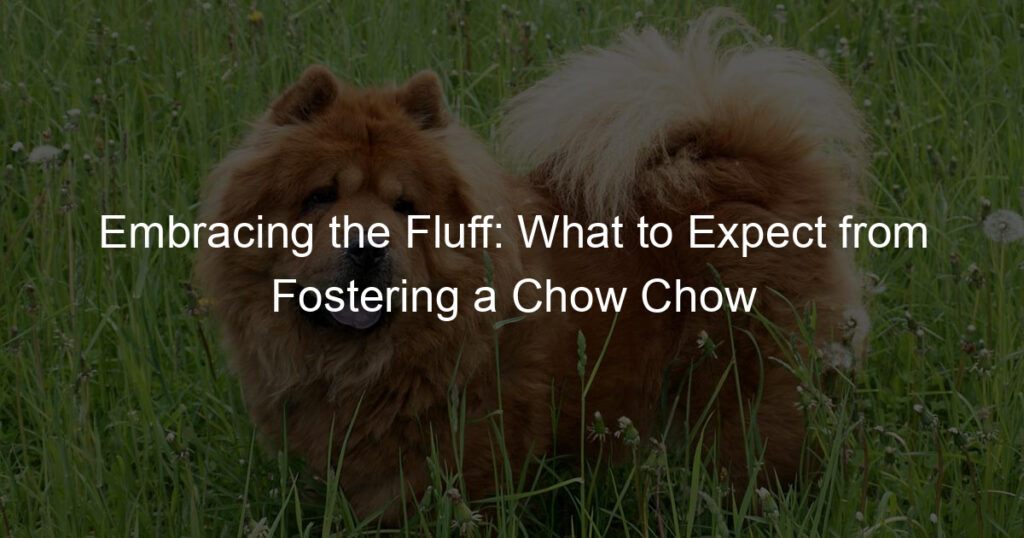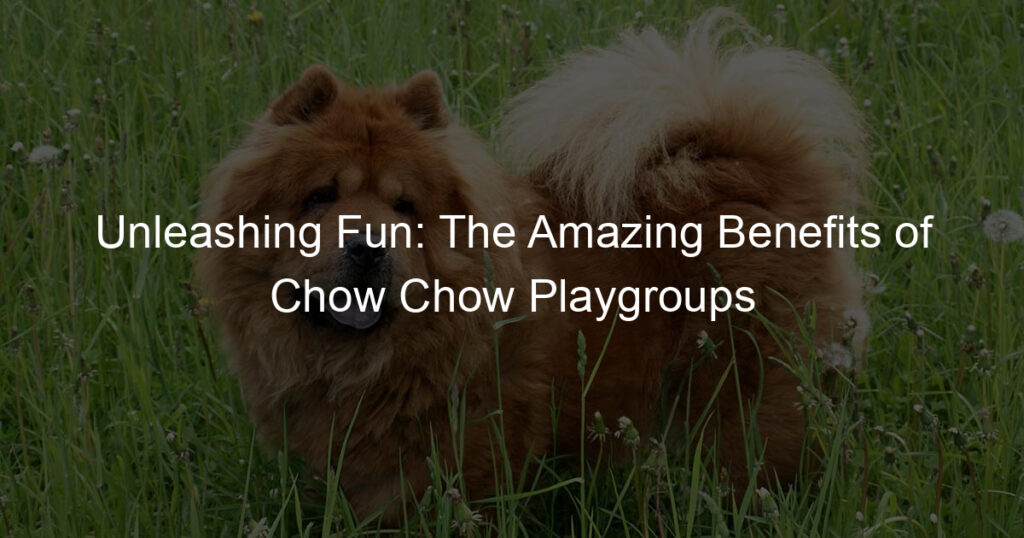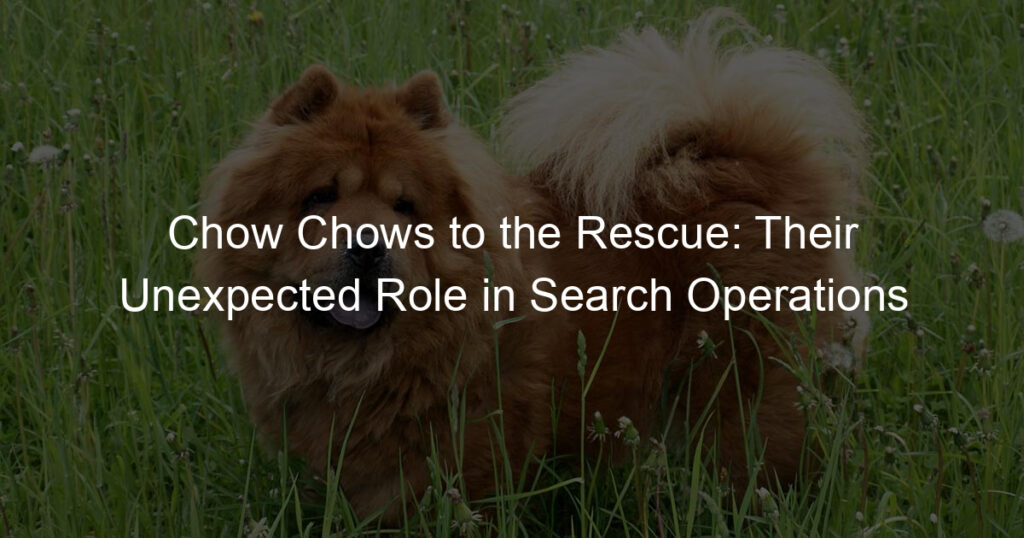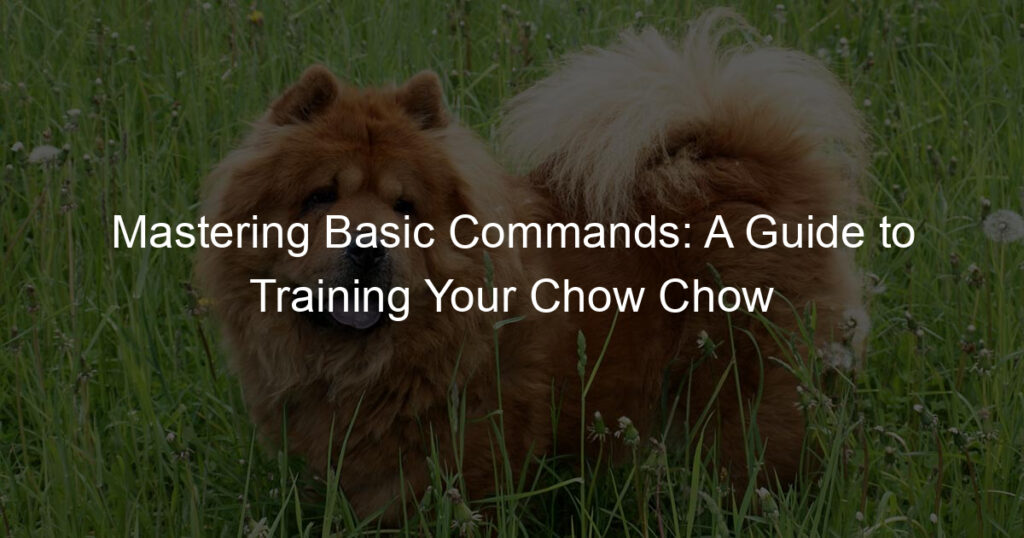Introduction to Fostering Chow Chow Dogs
Welcoming a Chow Chow into your home is a rewarding experience that comes with its unique set of challenges and joys. This section will provide you with an overview of what fostering a Chow Chow entails, the commitment required, and the benefits that come with it.
- Understanding the commitment
- Benefits of fostering a Chow Chow
Fostering a Chow Chow is a significant commitment that requires time, patience, and dedication. These dogs are known for their independent and sometimes aloof nature, which can make them a bit challenging for first-time foster parents. They require regular exercise, a balanced diet, and plenty of socialization to ensure they grow into well-rounded adults. It’s also important to remember that fostering is a temporary arrangement, and you’ll need to be prepared for the emotional aspect of saying goodbye when your foster Chow Chow finds their forever home.
Fostering a Chow Chow comes with numerous benefits. Not only do you provide a loving home for a dog in need, but you also play a crucial role in preparing them for their forever home. Fostering can be an incredibly rewarding experience, as you watch your foster dog grow and develop under your care. Additionally, fostering a Chow Chow allows you to enjoy the companionship of this unique breed without the long-term commitment of ownership. Lastly, many rescue organizations cover the cost of food, medical care, and other necessities for their foster dogs, making it a financially feasible option for many people.
In conclusion, fostering a Chow Chow is a commitment that requires dedication and patience, but the rewards are immeasurable. You get the chance to make a significant difference in a dog’s life, and in return, you receive the unconditional love and companionship of a Chow Chow.
What to Expect When Fostering a Chow Chow
When you decide to foster a Chow Chow, it’s essential to understand the breed’s unique characteristics. This will help you provide the best care and environment for your new furry friend. Let’s delve into the Chow Chow breed characteristics.
Chow Chow Breed Characteristics
Chow Chows are a distinct breed with unique physical characteristics, personality traits, and common health issues. Understanding these will help you provide the best care for your foster Chow Chow.
- Physical characteristics: Chow Chows are medium to large-sized dogs, typically weighing between 45 and 70 pounds. They are known for their lion-like mane, deep-set eyes, and blue-black tongue. Their dense double coat can be red, black, blue, cinnamon, or cream. Learn more about Chow Chow’s physical characteristics on Wikipedia.
- Personality traits: Chow Chows are often described as cat-like in their demeanor. They are independent, reserved, and can be aloof with strangers. However, they are also fiercely loyal to their families. With proper socialization, they can get along well with children and other pets.
- Common health issues: Like all breeds, Chow Chows are prone to specific health issues. These include hip and elbow dysplasia, eye problems like entropion, and skin conditions. Regular check-ups with a vet can help detect and manage these issues early.
Understanding these characteristics will help you anticipate what to expect when fostering a Chow Chow and how to provide the best care for them. Remember, every Chow Chow is unique, and individual dogs may vary from these general breed characteristics.
Chow Chow Foster Care Requirements
When fostering a Chow Chow, it’s crucial to understand the specific needs of this unique breed. Here are the four main areas to focus on:
- Proper Nutrition
- Regular Exercise
- Grooming Needs
- Veterinary Care
Chow Chows require a balanced diet to maintain their health and vitality. This includes high-quality dog food that is rich in protein, carbohydrates, and healthy fats. It’s also important to provide them with plenty of fresh water. Overfeeding should be avoided as this breed is prone to obesity. Learn more about Chow Chow’s nutritional needs here.
Chow Chows are not as active as some other breeds, but they still require regular exercise to keep them healthy and happy. This can include daily walks, playtime in the yard, or even agility training. However, due to their thick coat, care should be taken not to over-exert them in hot weather.
The Chow Chow’s thick double coat requires regular grooming to keep it healthy and looking its best. This includes brushing at least once a week to remove loose hair and prevent matting. They also need regular baths, nail trims, and ear checks. Read more about Chow Chow’s grooming needs here.
Regular veterinary check-ups are essential for the health of your Chow Chow. This includes routine vaccinations, heartworm prevention, and regular dental care. It’s also important to be aware of any breed-specific health issues, such as hip dysplasia and eye conditions. Find out more about Chow Chow’s health here.
By understanding and meeting these care requirements, you can ensure your foster Chow Chow thrives in your care.
Preparing for Chow Chow Fostering
When it comes to fostering a Chow Chow, preparation is key. This involves making your home a safe and comfortable environment for your new furry friend. Here are some steps to help you get started.
Home Preparation
Creating a safe and welcoming environment for your Chow Chow is crucial. This involves:
- Creating a safe space: Chow Chows need their own space where they can relax and feel secure. This could be a specific room or a designated area in your home. Make sure it’s quiet, comfortable, and free from hazards. Include a comfortable bed, toys, and access to food and water.
- Chow Chow-proofing your home: Chow Chows are curious by nature and may get into things they shouldn’t. It’s important to Chow Chow-proof your home to prevent accidents. This includes securing loose wires, removing toxic plants, and ensuring all small objects that could be a choking hazard are out of reach.
Remember, every Chow Chow is unique and may have different needs. It’s important to observe your Chow Chow and make adjustments as needed to ensure their safety and comfort.
Family Preparation
When considering fostering a Chow Chow, it’s essential for the entire family to be prepared. This includes understanding the responsibilities and training for handling a Chow Chow.
- Understanding the Responsibilities
- Training for Handling a Chow Chow
Bringing a Chow Chow into your home is a big responsibility. This breed requires regular exercise, a balanced diet, and plenty of social interaction. They also require regular grooming due to their thick coat. It’s important to remember that Chow Chows are not just pets, they are family members. They require time, attention, and love. If you’re ready to provide these, then you’re ready to foster a Chow Chow. Learn more about Chow Chow responsibilities here.
Chow Chows are known for their independent and sometimes stubborn nature. This means they require a firm, but gentle hand when it comes to training. It’s important to start training as early as possible, using positive reinforcement techniques. This includes rewarding good behavior with treats and praise. Remember, consistency is key when training a Chow Chow. Learn more about dog training here.
In conclusion, preparing your family for a Chow Chow involves understanding the responsibilities and training required. With the right preparation, your family will be ready to welcome a Chow Chow into your home.
Adopting Chow Chow Puppies Vs. Adult Dogs
When it comes to adopting a Chow Chow, one of the first decisions you’ll need to make is whether to adopt a puppy or an adult dog. Both options come with their own unique set of advantages and disadvantages. Let’s explore them in detail.
-
Pros and Cons of Adopting Puppies
Pros:
- Training: With a puppy, you have the opportunity to shape their behavior from a young age. This can make training easier, as you’re starting with a clean slate.
- Bonding: Raising a puppy allows for a strong bond to develop between you and your pet. This bond can be incredibly rewarding and fulfilling.
- Longevity: Puppies, being younger, typically have a longer lifespan ahead of them, giving you more time to spend with your new furry friend.
Cons:
- Time and Energy: Puppies require a lot of time, attention, and energy. They need to be trained, socialized, and housebroken, which can be a significant commitment.
- Cost: Puppies can be more expensive to adopt than adult dogs. They also require frequent vet visits for vaccinations and check-ups, adding to the overall cost.
- Uncertainty: With a puppy, it’s hard to predict exactly what their temperament or health will be like as they grow older.
-
Pros and Cons of Adopting Adult Dogs
Pros:
- Less Training: Adult dogs often require less training than puppies. Many are already housebroken and have basic obedience skills.
- Calmer Temperament: Adult dogs are typically calmer and less energetic than puppies. This can make them a better fit for households looking for a more relaxed pet.
- Known Personality: With an adult dog, what you see is what you get. Their personality is already developed, so there are fewer surprises.
Cons:
- Past Traumas: Some adult dogs may have experienced traumas or neglect in their past, which can lead to behavioral issues.
- Health Issues: Older dogs may have underlying health issues that aren’t immediately apparent. These can lead to additional vet costs and care.
- Shorter Time Together: Unfortunately, adopting an adult dog often means you’ll have a shorter time together compared to adopting a puppy.
In conclusion, there’s no right or wrong choice when it comes to adopting a Chow Chow puppy or adult dog. It all depends on your lifestyle, resources, and personal preferences. Whichever you choose, remember that every Chow Chow deserves a loving and caring home.
Chow Chow Rescue: Finding the Right Match
When it comes to rescuing a Chow Chow, it’s essential to find the right match for you and your family. This involves researching reputable rescue organizations and understanding the adoption process. Let’s delve into these two crucial steps.
- Researching reputable rescue organizations
Not all rescue organizations are created equal. Some may not have the best interests of the Chow Chow at heart. Therefore, it’s essential to do your homework and find a reputable rescue organization. Look for organizations that are registered, have positive reviews, and can provide references from previous adopters.
Reputable organizations will prioritize the health and well-being of the Chow Chow. They will ensure that the dog has been properly vetted, vaccinated, and treated for any health issues. They will also provide support and resources for new adopters, such as training tips and advice on Chow Chow care.
For more information on reputable rescue organizations, you can visit Wikipedia’s page on Dog Rescue.
- Understanding the adoption process
The adoption process can vary from one organization to another, but most follow a similar pattern. Typically, the process begins with an application, followed by a home visit or interview. The organization wants to ensure that the Chow Chow is going to a safe and loving home.
Once approved, there is usually an adoption fee. This fee helps cover the cost of caring for the Chow Chow while it was in the rescue’s care, including any medical treatments. After the adoption is finalized, the new owner will receive all the necessary paperwork, such as the dog’s medical records and adoption contract.
Understanding the adoption process can help prepare you for what to expect and ensure a smooth transition for both you and your new Chow Chow. Remember, adopting a rescue Chow Chow is not just about saving a life; it’s about providing a forever home for a dog in need.
Tips for Fostering Chow Chow Dogs
When it comes to fostering Chow Chow dogs, there are several crucial aspects to consider. One of the most important is behavioral training. This can help ensure your Chow Chow adapts well to their new environment and behaves appropriately.
Behavioral Training
Behavioral training is a key part of fostering a Chow Chow. This breed is known for its independence and stubbornness, which can sometimes make training a challenge. However, with the right approach, you can successfully train your Chow Chow to be a well-behaved and loving pet.
- Establishing routines
- Positive reinforcement techniques
Chow Chows thrive on routine. Establishing a consistent schedule for meals, walks, and playtime can help your Chow Chow feel more secure and reduce anxiety. This routine can also make training easier, as your dog will know what to expect and when.
Positive reinforcement is an effective method for training Chow Chows. This involves rewarding your dog for good behavior, rather than punishing them for bad behavior. Rewards can include treats, praise, or extra playtime. This approach not only encourages good behavior, but also helps to build a strong bond between you and your Chow Chow.
Remember, patience and consistency are key when it comes to training a Chow Chow. It may take time, but with the right approach, your Chow Chow can become a well-behaved and loving member of your family.
Health and Wellness
When it comes to fostering a Chow Chow dog, one of the most critical aspects to consider is their health and wellness. This breed, like any other, requires specific care to ensure they live a long, healthy, and happy life. Here are some key points to remember:
- Regular Vet Check-ups
- Importance of Vaccinations and Deworming
Regular vet check-ups are essential for maintaining your Chow Chow’s health. These check-ups allow the vet to detect any potential health issues early, which can lead to more effective treatment. According to the American Kennel Club, Chow Chows should have a vet check-up at least once a year. However, puppies or older dogs may require more frequent visits.
Vaccinations are crucial for preventing various diseases in Chow Chows. These include rabies, distemper, and parvovirus, among others. On the other hand, deworming helps to eliminate any worms that may be present in your dog’s system. Both vaccinations and deworming should be done according to the schedule recommended by your vet.
Remember, a healthy Chow Chow is a happy Chow Chow. By ensuring regular vet check-ups and keeping up with vaccinations and deworming, you can help your furry friend live a long and healthy life.
Conclusion: The Joy of Fostering a Chow Chow
As we conclude this comprehensive guide on fostering a Chow Chow, it’s important to reflect on the joy and fulfillment that comes with this noble act. Fostering a Chow Chow, whether a puppy or an adult, is not just about providing a temporary home for these adorable creatures, but it’s also about making a significant impact on their lives and yours.
- Sharing your fostering experience
- Encouraging others to foster
Sharing your fostering experience can be a powerful tool to inspire others. It’s not just about the challenges, but also the triumphs, the bonding moments, and the joy of seeing a Chow Chow thrive in your care. Your story could be the push someone needs to open their home and heart to a Chow Chow in need. For instance, consider the story of John and his Chow Chow, Max. Max was a rescue who had a rough start in life, but with patience, love, and care, he blossomed into a loving and loyal companion. This transformation was not just beneficial for Max, but also for John who found a new best friend in him.
Encouraging others to foster is another way to spread the love for Chow Chows. By fostering, you are not only saving a life but also freeing up space in the shelter for another dog in need. You can encourage others by sharing factual information about fostering, debunking myths, and highlighting the emotional and psychological benefits of fostering a Chow Chow. Remember, every Chow Chow deserves a chance at a happy and loving home, and fostering is a crucial step towards that goal.
In conclusion, fostering a Chow Chow is a rewarding experience that brings joy, fulfillment, and a sense of purpose. It’s a journey filled with love, patience, and learning. So, if you have the capacity to foster, don’t hesitate. Open your home and heart to a Chow Chow today. You won’t regret it.














